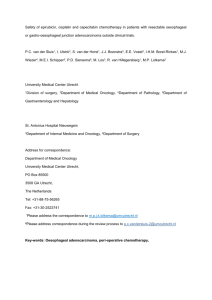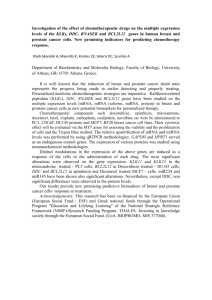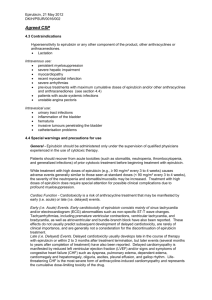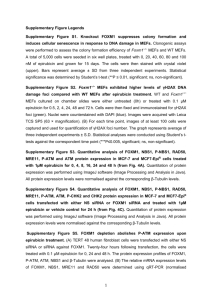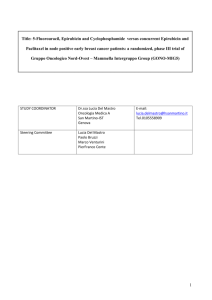IMPORTANT: PLEASE READ PART III: CONSUMER INFORMATION
advertisement
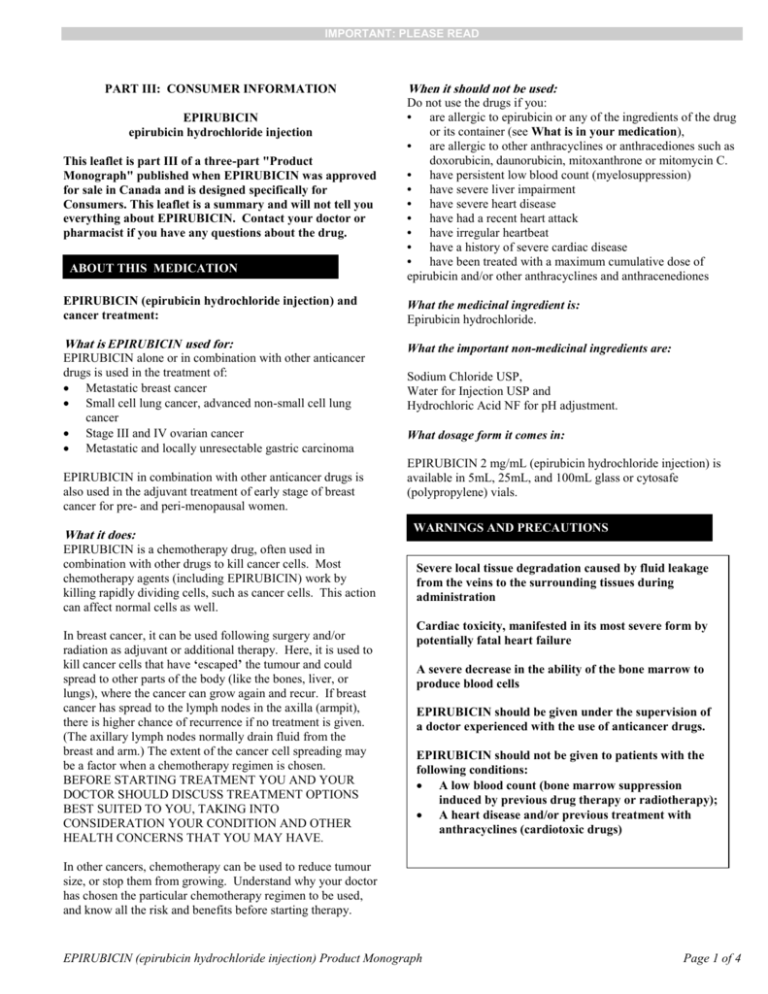
IMPORTANT: PLEASE READ PART III: CONSUMER INFORMATION EPIRUBICIN epirubicin hydrochloride injection This leaflet is part III of a three-part "Product Monograph" published when EPIRUBICIN was approved for sale in Canada and is designed specifically for Consumers. This leaflet is a summary and will not tell you everything about EPIRUBICIN. Contact your doctor or pharmacist if you have any questions about the drug. ABOUT THIS MEDICATION When it should not be used: Do not use the drugs if you: • are allergic to epirubicin or any of the ingredients of the drug or its container (see What is in your medication), • are allergic to other anthracyclines or anthracediones such as doxorubicin, daunorubicin, mitoxanthrone or mitomycin C. • have persistent low blood count (myelosuppression) • have severe liver impairment • have severe heart disease • have had a recent heart attack • have irregular heartbeat • have a history of severe cardiac disease • have been treated with a maximum cumulative dose of epirubicin and/or other anthracyclines and anthracenediones EPIRUBICIN (epirubicin hydrochloride injection) and cancer treatment: What the medicinal ingredient is: Epirubicin hydrochloride. What is EPIRUBICIN used for: What the important non-medicinal ingredients are: EPIRUBICIN alone or in combination with other anticancer drugs is used in the treatment of: Metastatic breast cancer Small cell lung cancer, advanced non-small cell lung cancer Stage III and IV ovarian cancer Metastatic and locally unresectable gastric carcinoma EPIRUBICIN in combination with other anticancer drugs is also used in the adjuvant treatment of early stage of breast cancer for pre- and peri-menopausal women. Sodium Chloride USP, Water for Injection USP and Hydrochloric Acid NF for pH adjustment. What dosage form it comes in: EPIRUBICIN 2 mg/mL (epirubicin hydrochloride injection) is available in 5mL, 25mL, and 100mL glass or cytosafe (polypropylene) vials. What it does: WARNINGS AND PRECAUTIONS EPIRUBICIN is a chemotherapy drug, often used in combination with other drugs to kill cancer cells. Most chemotherapy agents (including EPIRUBICIN) work by killing rapidly dividing cells, such as cancer cells. This action can affect normal cells as well. Severe local tissue degradation caused by fluid leakage from the veins to the surrounding tissues during administration In breast cancer, it can be used following surgery and/or radiation as adjuvant or additional therapy. Here, it is used to kill cancer cells that have ‘escaped’ the tumour and could spread to other parts of the body (like the bones, liver, or lungs), where the cancer can grow again and recur. If breast cancer has spread to the lymph nodes in the axilla (armpit), there is higher chance of recurrence if no treatment is given. (The axillary lymph nodes normally drain fluid from the breast and arm.) The extent of the cancer cell spreading may be a factor when a chemotherapy regimen is chosen. BEFORE STARTING TREATMENT YOU AND YOUR DOCTOR SHOULD DISCUSS TREATMENT OPTIONS BEST SUITED TO YOU, TAKING INTO CONSIDERATION YOUR CONDITION AND OTHER HEALTH CONCERNS THAT YOU MAY HAVE. Cardiac toxicity, manifested in its most severe form by potentially fatal heart failure A severe decrease in the ability of the bone marrow to produce blood cells EPIRUBICIN should be given under the supervision of a doctor experienced with the use of anticancer drugs. EPIRUBICIN should not be given to patients with the following conditions: A low blood count (bone marrow suppression induced by previous drug therapy or radiotherapy); A heart disease and/or previous treatment with anthracyclines (cardiotoxic drugs) In other cancers, chemotherapy can be used to reduce tumour size, or stop them from growing. Understand why your doctor has chosen the particular chemotherapy regimen to be used, and know all the risk and benefits before starting therapy. EPIRUBICIN (epirubicin hydrochloride injection) Product Monograph Page 1 of 4 IMPORTANT: PLEASE READ Before using EPIRUBICIN, tell your doctor if any of the following applies to you: if you have or have experienced a sensitivity or allergic reaction to epirubicin or any other component of the product (see what is in your medication), other anthracyclines or anthracenediones such as doxorubicin hydrochloride, daunorubicin hydrochloride, mitoxantrone or mitomycin C. if you have low blood cell counts due to a decreased ability of the bone marrow to produce blood cells if you have severe liver disease if you have a heart disease, recent heart attack or irregular heartbeat if you are taking other drugs (including calcium channel blockers) or have been previously treated with EPIRUBICIN or other anti-cancer drugs, including anthracyclines (cardiotoxic drugs). As EPIRUBICIN may be harmful to an unborn child, women should be advised to avoid becoming pregnant. Effective contraceptive methods should be used. Tell your doctor right away if you become pregnant during treatment. If you have been nursing, you should stop before starting treatment with EPIRUBICIN. Ask your baby’s doctor to recommend a formula that would be best for your baby. INTERACTIONS WITH THIS MEDICATION Administration of live vaccines to immunosuppressed patients including those undergoing cytotoxic chemotherapy should be avoided. PROPER USE OF THIS MEDICATION How is EPIRUBICIN given? Some patients may receive EPIRUBICIN through a vein in the arm (“intravenously” or “IV”) by their doctor or nurse, usually in the hospital, outpatient department or clinic. If you are getting many injections over several weeks or months, for your convenience, your doctor may insert a catheter (thin tube) or port into a large vein in your body that is placed there as long as it is needed. Medicines get injected through the catheter or port rather than directly into a vein. How much time does it take to get a treatment with EPIRUBICIN? It usually takes about 5 minutes to inject EPIRUBICIN. However, you may get other medicines before or after EPIRUBICIN, so your entire treatment may last an hour or longer. How long will I need treatment? Your doctor will determine the length of your treatment based on your treatment goals, the medicines you receive, and how your body responds to those medicines. Adjuvant chemotherapy for breast cancer usually lasts 3-6 months, however. Chemotherapy is usually given in cycles that include rest periods between treatments. The rest periods give your body a chance to build healthy new cells and regain your strength before your next treatment. EPIRUBICIN is given in treatment cycles of 21 days or 28 days. You may receive one dose of EPIRUBICIN every three or four weeks (on Day 1 of the cycle). Or, you may receive EPIRUBICIN in two doses - one dose on Day 1 of the cycle, and another dose on Day 8. Your treatment cycle will depend on your medical condition and the other chemotherapy medicines you are getting. Will I be able to work? Some people work full time, while others work part time or wait until their chemotherapy treatments are finished. It depends on the type of job you have and the side effects you experience. Is it okay to become pregnant or nurse a baby? No. EPIRUBICIN can be harmful to an unborn child. If there is any possibility that you may become pregnant, ask your doctor about using birth control to prevent pregnancy during your treatment with EPIRUBICIN. Tell your doctor right away if you become pregnant during treatment. If you have been nursing, you should stop before starting treatment with EPIRUBICIN. Ask your baby’s doctor to recommend a formula that would be best for your baby. What should men consider when taking EPIRUBICIN? Men undergoing treatment with epirubicin should use effective contraceptive methods. What happens after treatment? After you have completed all your chemotherapy treatments, your doctor will check you regularly to make sure the cancer has not returned. Overdose: If you think you are given more EPIRUBICIN than you should, contact your doctor, nurse, or poison control centre immediately. Missed Dose: If you miss your scheduled treatment with the drug, contact your doctor as soon as possible to schedule your next treatment. EPIRUBICIN (epirubicin hydrochloride injection) Product Monograph Page 2 of 4 IMPORTANT: PLEASE READ SERIOUS SIDE EFFECTS AND WHAT TO DO ABOUT THEM SIDE EFFECTS AND WHAT TO DO ABOUT THEM Like all medicines, EPIRUBICIN may cause side effects. Everyone reacts differently to chemotherapy and not all people will experience every side effect. Common side effects include: hair loss, which is temporary and usually starts to grow back within 2 or 3 months after you have finished your treatments. increased risk of infection, as a result of low white blood cell count. The signs of infection include fever over 38°C (100°F), chills or sweating, sore throat or coughing, redness or swelling around a cut, wound or a catheter site, a burning feeling when you urinate, unusual vaginal itching or discharge. nausea and vomiting, fatigue, or feeling tired. mouth sores. EPIRUBICIN is a red-orange coloured liquid and will make your urine turn red for a few days after treatment. The kinds of side effects, how often they occur, and how bad they may be could be related to the dose of chemotherapy, or the regimen used. Rare side effects include: Damage to the heart muscle, which can cause symptoms such as shortness of breath, swelling in the ankles, and fluid retention. If you have these symptoms, call your doctor right away. There are medicines to treat this condition. Secondary leukemia (less than 1% of patients) up to 5 years after treatment with EPIRUBICIN. The chances of developing heart damage or leukemia appear to be related to either how much chemotherapy you have received, or the dose of EPIRUBICIN used. Be sure you discuss the risks and benefits of various chemotherapy options with your doctor, and understand the side-effects both immediate and long-term that you could have from your treatment before you start therapy. Symptom / effect Low white blood cell count and symptoms such as increased infection, fever > 38°C, chills or sweating, sore throat, mouth sores, burning feeling when urinating, unusal vaginal itching or discharge Anemia (reduced red blood cell) and symptoms such as feeling weak, dizzy, shortness of breath Injection site reactions such as pain, sores, burning Increased bleeding with symptoms such as dark urine or dark/bloody stool, unexplained bruising Cardiovascular problems with symptoms such as irregular heartbeat,chest pain, swelling of the ankle, shortness of breath / cardiac problems Bowel inflammation (colitis) or, digestive tract bleeding and symptoms such as bloody stools, bloody vomit Talk with your doctor or pharmacist Only if severe In all cases This is not a complete list of side effects. For any unexpected effects while taking EPIRUBICIN, contact your doctor or pharmacist. EPIRUBICIN (epirubicin hydrochloride injection) Product Monograph Page 3 of 4 IMPORTANT: PLEASE READ REPORTING SUSPECTED SIDE EFFECTS You can report any suspected adverse reactions associated with the use of health products to the Canada Vigilance Program by one of the following 3 ways: Report online at www.healthcanada.gc.ca/medeffect Call toll-free at 1-866-234-2345 Complete a Canada Vigilance Reporting Form and: Fax toll-free to 1-866-678-6789, or Mail to: Canada Vigilance Program Health Canada Postal Locator 0701D Ottawa, Ontario K1A 0K9 Postage paid labels, Canada Vigilance Reporting Form and the adverse reaction reporting guidelines are available on the MedEffect™ Canada Web site at www.healthcanada.gc.ca/medeffect. NOTE: Should you require information related to the management of side effects, contact your health professional. The Canada Vigilance Program does not provide medical advice. MORE INFORMATION This document plus the full Product Monograph, prepared for health professionals can be found at: http://www.Pfizer.ca, or by contacting the sponsor, Pfizer Canada Inc. at: 1-800-463-6001. This leaflet was prepared by Pfizer Canada Inc. Last revised: 27 August 2014 EPIRUBICIN (epirubicin hydrochloride injection) Product Monograph Page 4 of 4
